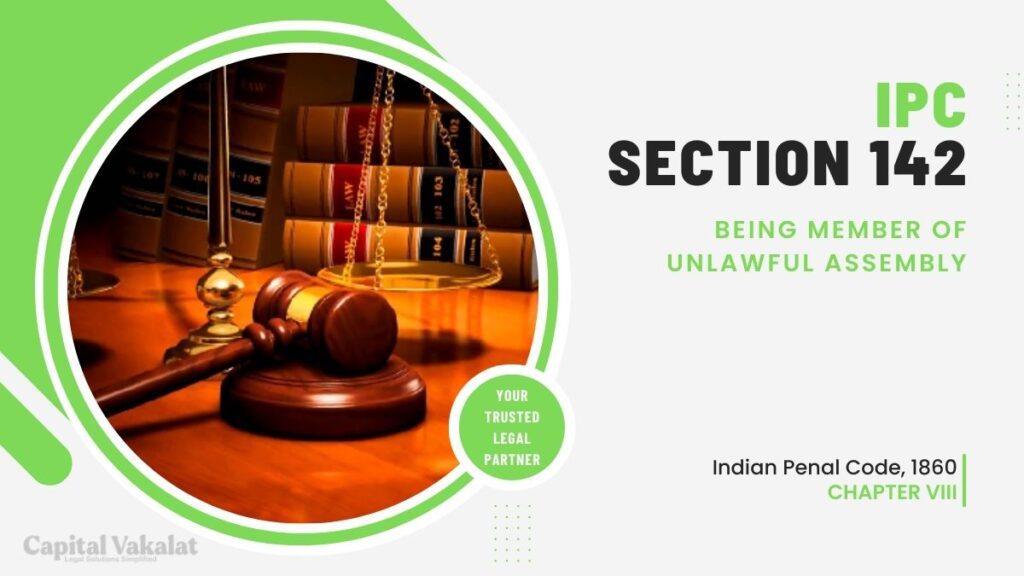In India, the Indian Penal Code (IPC) is the primary criminal code that defines various offenses and their corresponding punishments. Among the numerous sections within the IPC, Section 142 holds significance as it deals with individuals who are members of an unlawful assembly.

This article will provide a comprehensive overview of Section 142 IPC, discussing its key provisions, historical context, real-life examples, and the impact it has on society.
Unlawful Assembly Defined
An unlawful assembly is a group of five or more persons who assemble with the common object of committing a crime. The Indian legal system takes such assemblies seriously, as they often lead to breaches of peace and public order. It’s important to understand the elements that constitute an unlawful assembly, which may include intent, presence, and common objectives.
Section 142 IPC: Key Provisions
Section 142 of the IPC outlines the punishments for individuals who become part of an unlawful assembly. It’s crucial to note that the severity of the punishment varies depending on the specific offense committed during the assembly. This section helps maintain law and order by holding members accountable for their actions.
Essential Ingredients of Section 142 IPC
To invoke Section 142 IPC, it’s vital to understand what constitutes a “member” in an unlawful assembly. The section specifically mentions that a member of the unlawful assembly can be held accountable for any offense committed by the assembly if it was done in the pursuit of the common object.
Purpose and Intent of Section 142 IPC
The legislative intent behind Section 142 IPC is to deter individuals from participating in unlawful assemblies, thereby preventing potential disruptions to peace and order. By holding members responsible for the actions of the assembly, this section acts as a deterrent and ensures accountability.
Historical Context
Section 142 IPC has its roots in India’s colonial past and was included in the IPC during the British era. Over the years, it has undergone several amendments to adapt to the evolving legal landscape and changing societal needs.
Cases and Examples
Real-life cases illustrate the practical application of Section 142 IPC. These cases often involve large gatherings or protests that turn violent, highlighting the significance of this legal provision in maintaining law and order.
Rights and Responsibilities of a Member
Individuals who become part of an unlawful assembly have rights, but they also carry significant responsibilities. Understanding these rights and responsibilities is essential to navigate the legal implications of their involvement.
Defenses in Section 142 Cases
For individuals charged under Section 142 IPC, various defenses can be employed to challenge the allegations. Legal strategies and precedents play a crucial role in these cases.
Police Action and Investigation
The role of law enforcement agencies in dealing with unlawful assemblies cannot be overstated. The police play a critical role in invoking Section 142 IPC and ensuring that justice is served.
Impact on Society
The broader impact of unlawful assemblies on society includes disruptions, fear, and potential violence. Maintaining public peace and harmony is paramount, and Section 142 IPC serves as a tool to achieve this.
Amendments and Reforms
As with any legal provision, Section 142 IPC may undergo amendments or discussions regarding reform. Legal experts and lawmakers often debate the necessity of changes to address emerging challenges.
Global Comparisons
Comparing Section 142 IPC to similar laws in other countries provides valuable insights into international standards for dealing with unlawful assemblies.
Challenges and Concerns
Enforcing Section 142 IPC poses certain challenges, including balancing individual rights and collective security. Addressing these concerns is essential for a fair and just legal system.
Conclusion
In conclusion, Section 142 IPC plays a pivotal role in maintaining law and order in India. It holds members of unlawful assemblies accountable for their actions, ensuring that public peace is not disrupted. Understanding the provisions and consequences of this section is crucial for both legal practitioners and the general public.
FAQs
What is the maximum punishment for being a member of an unlawful assembly?
The punishment varies depending on the specific offense committed during the assembly. It can range from a fine to imprisonment.
Can Section 142 IPC be used to suppress dissenting voices?
Section 142 IPC is meant to maintain law and order, not to suppress dissent. It is essential to balance individual rights with collective security.
Are juveniles treated differently under Section 142 IPC?
Juveniles may be subject to different legal procedures and penalties, considering their age and capacity to understand the consequences of their actions.
Juveniles may be subject to different legal procedures and penalties, considering their age and capacity to understand the consequences of their actions.
Many countries have laws addressing unlawful assemblies, although the specific provisions may vary. It’s essential to research the laws of a particular jurisdiction to understand their implications.